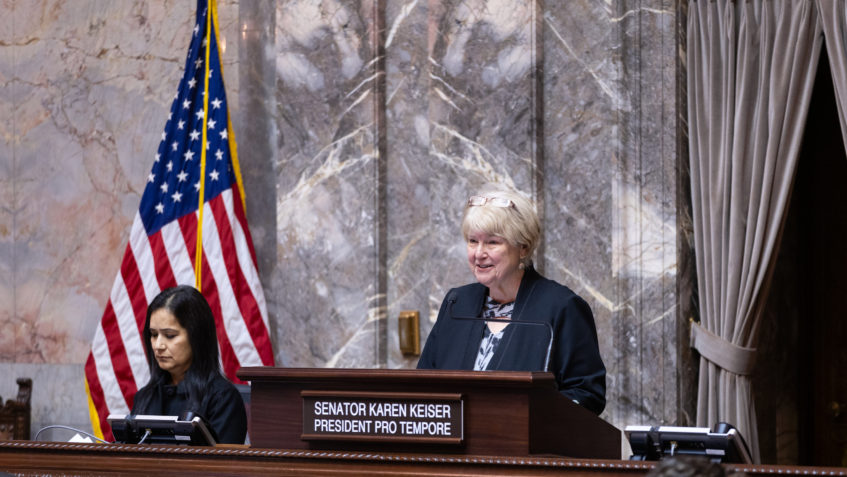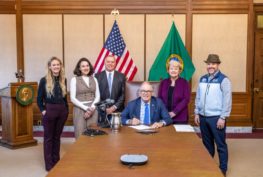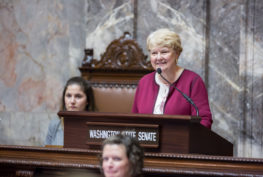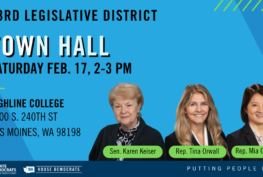Dear neighbors,
Our state has benefited greatly from having a well-designed regulatory framework for cannabis that works well for consumers and businesses — one that has established public trust.
When there are new developments in the market, it’s important that we update our system to maintain that public trust.
I am concerned that the proliferation of high-potency cannabis products — in some cases up to 100% THC, when a cannabis plant is only 15% — is posing a danger to consumers, especially to young people.
That’s why I’ve sponsored SB 6721, which would use the blueprint we have successfully used with tobacco to better regulate cannabis.
The bill would first have the Liquor and Cannabis Board (LCB) collect data on how much of the cannabis market is high-THC sales. Right now we only have data by gross revenue, not by product. The next step in the bill is for the LCB to propose a revenue-neutral shift in the tax structure such that the higher the THC content, the higher the tax. The tax rate would be lower than the current 37% on lower-THC products, and higher on high-THC products. The goal is to bring in the same amount of revenue while helping reduce the consumption of high-THC products — just as our tobacco tax has decreased consumption, especially among young people.
This bill has been passed out of committee and is in Rules.
Another bill we have heard in the Labor & Commerce Committee, SB 6220, would also help reduce usage of high-THC products by young Washingtonians.
Read on for an update on other legislation I’m sponsoring this session.
Ready for a vote of the full Senate
SB 5777 would safeguard a fundamental right — the right to join together to fight for fair wages and working conditions. Low-wage workers are stressed just to pay their rent and put food on the table. Many unions don’t have strike benefits, so not having access to unemployment insurance puts pressure on workers not to go out on strike or to end a strike earlier. Some employers take advantage of that and refuse to bargain — hoping to starve out their workers. This bill would prevent that by allowing striking workers access to unemployment benefits.
SB 5368 is a bipartisan bill that would help people who have been injured on the job return to work by coordinating with nonprofits for meaningful placement. The stay-at-work program allows employees to get back to work sooner at a lightened capacity, boosts morale, and provides relief for the whole team. It also reduces the cost of claims by workers and the premiums paid by the workers as well. This is a path to reengagement and community for injured workers so that they do not suffer disconnection, depression, and permanent disability.
SB 5778 would prohibit employers from disciplining or firing employees who refuse to attend meetings that are intended to communicate the employer’s opinion on religious or political matters. Employers use these captive audience meetings to intimidate and threaten employees trying to unionize, and this bill would protect against that.
In the Rules Committee
SB 5979 would help properly ensure construction workers accrue paid sick leave. Until the passage of my legislation SB 5111 last year, construction workers with short-term jobs were never able to use paid sick leave even when working full time because they didn’t meet the threshold to accrue leave, which is 90 days with one employer. All workers in the state should have access to paid sick leave, and this bill ensures that last year’s legislation will work as intended.
In committee
SB 5776 would enable patients in need to access a month’s emergency supply of insulin at $10 once a year. You can read more in my earlier e-newsletter here. This bill has passed the Health & Long Term Care Committee and is awaiting a hearing in Ways & Means.
SB 5775 would protect patients with allergies who need epinephrine by capping the cost of epinephrine autoinjectors at $60 for a two-pack. You can also read about this one in that earlier e-newsletter. Rep. Dave Paul is sponsoring similar legislation in the House, HB 1979, which has been passed to the House Rules Committee.
SB 5980 would require the Department of Labor & Industries to notify the owners of construction sites of hazards within ten days of an inspection. This would better ensure safety on building sites and allow employers to make timely safety correction. This bill is awaiting executive action in the Labor & Commerce Committee on Monday, Jan. 29.
SB 5955 would help around 200 homeowners in communities around Sea-Tac Airport who received soundproofing “port packages” from the Port of Seattle, but whose soundproof windows have leaked or otherwise failed. This is just the first step of our work to help protect the residents of the 33rd Legislative District from the noise and air pollution caused by Sea-Tac. This bill is awaiting executive action in the Labor & Commerce Committee on Tuesday, Jan. 30.
Save the date!
Rep. Tina Orwall, Rep. Mia Gregerson, and I will be holding an in-person town hall on Saturday, Feb. 17 in the 33rd Legislative District. More details to come!
Stay in Touch
Thank you to all the constituents and advocates who came to Olympia this week to make your voices heard. If you’d like to follow what I’m working on, you can like my official legislative Facebook page here.
Please don’t hesitate to stay in touch. Stay safe and take care.
Always,

Sen. Karen Keiser
Senate President Pro Tempore
Chair, Senate Labor & Commerce Committee




